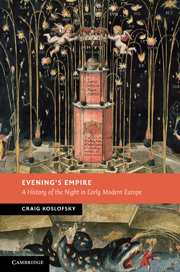Book contents
- Frontmatter
- Contents
- Figures
- Maps
- Acknowledgments
- Chapter One An early modern revolution
- Chapter Two Darkness and the Devil, 1450–1650
- Chapter Three Seeking the Lord in the night, 1530–1650
- Chapter Four Princes of darkness: the night at court, 1600–1750
- Chapter Five “An entirely new contrivance”: the rise of street lighting, 1660–1700
- Chapter Six Colonizing the urban night: resistance, gender, and the public sphere
- Chapter Seven Colonizing the rural night?
- Chapter Eight Darkness and Enlightenment
- Chapter Nine Conclusion
- Notes
- Bibliography
- Index
Chapter Nine - Conclusion
Published online by Cambridge University Press: 05 August 2013
- Frontmatter
- Contents
- Figures
- Maps
- Acknowledgments
- Chapter One An early modern revolution
- Chapter Two Darkness and the Devil, 1450–1650
- Chapter Three Seeking the Lord in the night, 1530–1650
- Chapter Four Princes of darkness: the night at court, 1600–1750
- Chapter Five “An entirely new contrivance”: the rise of street lighting, 1660–1700
- Chapter Six Colonizing the urban night: resistance, gender, and the public sphere
- Chapter Seven Colonizing the rural night?
- Chapter Eight Darkness and Enlightenment
- Chapter Nine Conclusion
- Notes
- Bibliography
- Index
Summary
Nocturnalization was a revolution in early modern Europe. In the seventeenth century princes and urban oligarchs alike projected their glory onto the night with illuminations and fireworks displays, while purpose-built baroque theaters could be fully darkened, day or night, to enable the complex “special effects” and illusions of baroque opera or theater. These practices reveal a new willingness to deploy and manipulate darkness and the night. And as the eighteenth century began, Europeans in cities and at royal courts – and even a few in the countryside – encountered the night equipped with more domestic lighting, new street lighting, and new, sober beverages like coffee and tea. In cities, the abandonment of curfews and the rise of the club and the coffeehouse transformed late hours into a time of polite sociability and conversation. For those exposed to increased domestic lighting, sleep itself reflected this new relationship with the night. The traditional biphasic sleep pattern of a “first” and “second” sleep began to give way to a single compressed period of nightly slumber. These are all signs of the uneven but distinct march of nocturnalization.
The sources of this nocturnalization were many. In the fractured Christendom of the confessional age, religious persecution and a disorientingly heterodox world led some to seek refuge, literal or allegorical, in the night. Nicodemus, the disciple “which at the first came to Jesus by night” became the byword for those who sought the Lord at night. The persecution which sporadically drove early modern Christians into the night marks the growth of both the scope and the ambitions of the early modern state, as state churches replaced or buttressed the authority of Rome. The expanding reach of these states, focused on moral and social discipline, included the policing of the urban night. Sweeping disciplinary ambitions were seldom realized, but the policing of the urban night rested on a long tradition and was one area of relatively successful oversight. Supported by this oversight, the elites of the court and city colonized the urban night, displaying their conspicuous consumption of time (and, materially, lighting) alongside their enjoyment of coffee, tea, fine porcelain, and other luxuries. The evening and night became the time of the emerging public sphere as the respectable public used the night which the authorities had helped colonize to gather and critique those same authorities, from the most mundane to the most exalted. The breadth of nocturnalization arose from its sources in state, public, and private initiative as a key site where projects of discipline and consumption overlapped.
- Type
- Chapter
- Information
- Evening's EmpireA History of the Night in Early Modern Europe, pp. 276 - 282Publisher: Cambridge University PressPrint publication year: 2011



